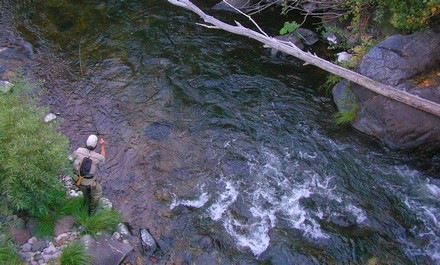Fly fishing's supposed to be a gentle sport, where you revel in the solitude of nature, telling life's everyday hassles they can kiss your ass while you're on the river.
Sadly, you might not have much access to that river
if the Siskiyou County Board of Supervisors's proposed Natural Resources Plannbsp;declares the Upper Sacramento, McCloud, Shasta and Scott Rivers as "Non-Navigable."
That means you'll have no right to wade or fish those rivers between the high water marks -- rights you've enjoyed (until now).
(The adjacent landowner owns the streambed on non-navigable rivers).

Will you lose the right to wade the Upper Sacramento and McCloud Rivers?
Of course, one of the tests of "navigability" is whether the waterway has been used for commerce in the past, and the Upper Sacramento has definitely been used for commerce.
In other words, the Sisikiyou County Board of Supervisors wants to limit your legal right to access the Upper Sacramento between the high water marks.
Wow. Stream access issues finally come home to the Trout Underground.
Feeling gentle and relaxed? I'm not. I'm pissed.
The Cuckoo's Nest
Politics up here are byzantine, and while the south end of the county is where all the growth is occurring -- especially in sustainablenbsp;industries -- the power rests up north. Controlled largely bynbsp;ranchers, agriculture, timber, mining interests, etc, the concept is they're willing to manage natural resources for the good of those few constituencies while the rest of us -- including fly fishermen -- can basically kiss their ass.
If you think that's an overreaction, then read these selected paragraphs from the draft version of the County's Proposed Natural Resources Plan:
- Siskiyou County opposes any additional designations of Wild and Scenic Rivers in the County;
- All rivers in Siskiyou County with the exception of the Klamath River, are recognized as non-navigable streams, with bed and banks owned as private property by adjacent landowners. The Klamath River has been declared as ?navigable,? however, private property rights in mineral claims in the bed and banks are recognized;
They also want to classify in-stream suction dredge mining as an entirely "benign" activity, and get a load of these gifts to cattle ranchers:
- Current grazing allotments shall be continued and principally managed to produce forage to support maximum carrying capacity by domestic livestock;
- Traditional use of grazing allotments for livestock grazing will take precedence over other competing uses;
And if you think "competing uses" includes fisheries, you're right.
There is nothing good for fishermen or the environment in this crazy document, which is bascially an anti-environmental manifesto from the early 90's "Wise Use" movement -- one filled with gifts to extractive industries (mining & timber), cattle interests, agriculture, etc.
(Can anyone explain why the rights of suction dredge miners are so carefully protected when fishermen receive no significant mention?)
It's a divisive screed, and even the timber guys think it's too restrictive. It also ignores all the progress that's been made in recent years by ranchers and environmental groups working together.
Finally, it's attempting to control things which this county has absolutely no jurisdiction over -- a state of affairs which guarantees gridlock and lawsuits.
Sound good yet? No, not to me either.
Protect Public Access on the Upper Sac and McCloud
Contact the County Supervisors (e-mail or call -- contact information below) and let them know you don't support the Environmental Resources Plan, and that if enacted, it will harm the sustainable tourist economy in Siskiyou County.
The first two Supervisors actually sit on the committee (Armstrong is driving this policy), and if you only contact two people, they're the two. (My advice? Send e-mails to everyone, but call Kobseff and Armstrong.)
Michael Kobseff
mkobseff@co.siskiyou.ca.us
(530) 918-9128
Marcia Armstrong
marmstrong@co.siskiyou.ca.us
(530) 468-2824
LaVada Erickson (she's on our side, but isolated politically)
erickson5031@sbcglobal.net
(530) 926-1285
Jim Cook (McCloud representative -- let him know how much the town stands to lose)
jimcook@snowcrest.net
(530) 459-0459
Bill Overman
bandm@nctv.com
(530) 842-5389
I know you guys get a dozen e-mails a day asking you to take action, but for anyone who fishes the Upper Sacramento, McCloud, Scott, Shasta Rivers, this one's worth a few minutes.
Even if the "non-navigable" designation is thrown out, the other provisions are ridiculous, wholly unbalanced, and willnbsp;ultimately damage our fisheries.
This is only the tip of this very messy, messy thing, with lots more to come. See you in the political arena, Tom Chandler.
siskiyou county, stream access, upper sac, upper sacramento river, mccloud river